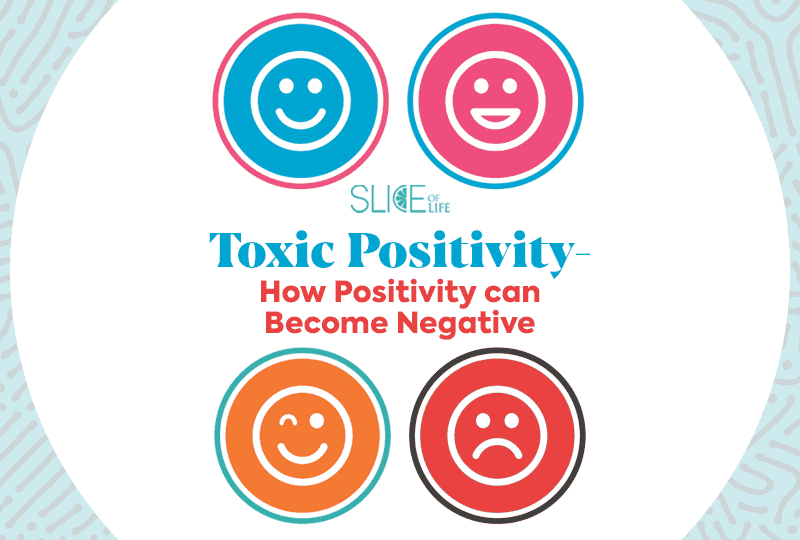Ever meet someone so unfailingly positive and chipper that it grated on you like sitcom nails on a chalkboard? Of course, there is nothing wrong with positive thinking, optimism and a sunny disposition, but there is a dark side to positivity if it is continually prioritized over all other types of feeling. Psychology Today tackles the issue head on in their article aptly named “Toxic Positivity.”
Toxic Positivity is defined as the intention to avoid, suppress or reject negative emotions or experiences in yourself or in others. It is a form of emotional gaslighting, denying anything that does not fit a happy, carefree narrative. Sometimes it makes sense to push past distressing thoughts in the moment, such as in a crisis to deal with the immediate tasks at hand. However, continually ignoring negative feelings in the long term does not resolve them or make them go away, it simply stuffs the emotions into a corner until they explode out in destructive and counter-productive ways.
Toxic positivity refers to a behavioral pattern and is not an official psychological term or diagnosis. It is a term that should be used with caution as it can sometimes be overused to the point of discouraging healthy positivity. While it is important to try to remain resilient in the face of adversity, it is also important to remember that life is hard, and it is OK not to feel OK all the time. In a toxic positivity frame of mind, you might decide to suppress hard emotions in favor of a “Fake it ‘til You Make It!” approach. Typically, this means that underlying emotional issues remain unresolved while guilt, shame, sadness and anxiety often compound or magnify. Being honest with yourself and with those around you fosters authenticity and true well-being, which is much more meaningful than fake optimism.
What Does Toxic Positivity Look Like?
Toxic positivity can be tricky to spot, but it is characterized by a fierce resistance to acknowledging or accepting negative emotions. Here are a few examples of how this might play out:
- Statement: “I’m not feeling comfortable with the way I look lately.” Response: “Every body is a beautiful body. You need to love the way you look.”
- Statement: “I’m bummed that I can’t afford to go to that concert.” Response: “You have so many things to be grateful for; you have no right to complain.”
- Statement: “I’m tired all the time.” Response: “Have some coffee and power through!
Reframing Positivity in a Healthful Outlook
The trouble with all the responses above is that they completely deny the validity of the person’s feelings. It can be easy to give responses like these and think you are being helpful. Instead, take the time to let yourself or your friend feel the necessary feelings and then begin the healing process to move through it.
If you or a friend have fallen into toxic positivity patterns, there are ways to retrain the brain toward more constructive ends. UW Medicine clarifies some of these strategies in their article “What You Need to Know About Toxic Positivity.”
- Keep Mindfulness in Mind- Try not to quickly react to something someone says or to an intrusive thought. Take a calming breath and take stock of what you are feeling and how it is manifesting in the body and the mind. There is no need to pull everything apart right away; just take everything in. If you notice negativity, try not to judge it one way or another. Make note of it and move on, if possible. If it is a reoccurring issue that requires more exploration, consider working through it with an unbiased and safe therapeutic professional.
- Emotions are tools- Emotions serve as pure teachers to teach us about ourselves and our needs. Remember to give your emotions space to exist without letting them take over your common sense.
- Clarify your ask- Toxic positivity often comes up in venting scenarios when someone just wants to get some tough feelings off their chest. Often the listener misinterprets their friend’s needs in that moment and begins to rattle off well-intentioned but unsolicited and unwanted advice. An easy way to prevent this is to give your friend a quick heads-up by saying, “Hey, if you don’t mind, I need to vent about my bad day for a minute. I don’t really need any advice right now.” On the other side, if you have a friend who is telling you about difficult situations, ask “Do you need empathy right now or helpful input?” A simple, upfront statement or question at the beginning does the leg work of steering conversations into a more effective path.
Slice of LIFE is an invitation to and extension of everything happening at Life University. Whether you are a current student, a potential freshman or a proud alum, Slice of LIFE can help keep you connected to your academic community. Know of a compelling Life U story to be shared, such as a riveting project, innovative group or something similar? Let us know by emailing Marketing@life.edu.


Social Media